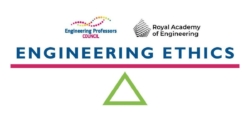 “Discussing ethical issues can be a daunting prospect, whether one-to-one or with an entire classroom.”
“Discussing ethical issues can be a daunting prospect, whether one-to-one or with an entire classroom.”
If you feel daunted by the prospect of dealing with tricky subjects in class, our Engineering Ethics Toolkit guidance article Tackling tough topics in discussion has some tips and techniques that will make it easier for you.
This guidance article should be read by educators at all levels in higher education who wish to integrate ethics into the engineering and design curriculum, or into module design and learning activities.
We have a growing library of guidance articles available to support you as you expand your understanding of engineering ethics, and begin to embed it within the curriculum, and an Ethics Explorer to get you started. We also have a library of case studies, for you to use and adapt in your teaching.
Want to contribute your own content to the Ethics Toolkit? Get involved here.
 “Discussing ethical issues can be a daunting prospect, whether one-to-one or with an entire classroom.”
“Discussing ethical issues can be a daunting prospect, whether one-to-one or with an entire classroom.”